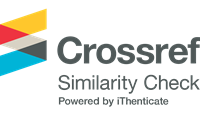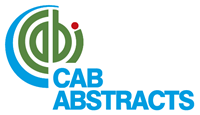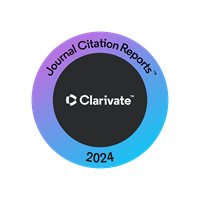Morpho-anatomical characterization, gene expression and protein cell wall modifications associated with natural finger drop in bananas
Resumo
Banana (Musa spp.) is one of the main fruits consumed worldwide. However, finger drop, is a physiological disorder that causes many postharvest problems, which eventually reduces market value and consumer acceptance. Therefore, the objective of the study was to evaluate the anatomical changes that occur in the pedicel rupture area (drop zone) of bananas diploids (BB França) and tetraploid (BRS Pioneira) in three ripening stages. The levels of gene expression involved in the natural ripening process and in the development of finger drop, was also investigated. The accumulation of their mRNAs and those of expansin (EXP1), pectate lyase (PEL1) and xyloglucan endotransglucosylase/hydrolase protein (XTH4) genes already isolated from bananas were measured by quantitative polymerase chain reaction in three ripening stages. BB França presented a higher resistance to finger drop due to the presence of some specific morphoanatomical characteristics, such as larger parenchymal cells and greater deposition of lignin. In contrast, there was degeneration of the pedicel parenchymal tissue of the BRS Pioneira genotype, forming large empty spaces during the ripening of the fruits, mainly in stage 6, which contributed to the finger drop. The diploid BB França is a strong candidate for use in banana breeding programs aimed at fruit drop resistance. This will certainly improve the quality of banana varieties. Moreover, PEL1 proved to be an excellent candidate gene for functional studies of finger drop in bananas.
Downloads
Referências
Amnuaysin, N., Jonesc, M. L., & Serayheap, K. (2012a). Changes in activities and gene expression of enzymes associated with cell wall modification in peels of hot water treated bananas. Scientia Horticulturae, 142, 98-104. DOI: https://doi.org/10.1016/j.scienta.2012.05.006
Amnuaysin, N., Seraypheap, K., & Kidyoo, M. (2012b). Anatomical changes in peel structure of ‘Hom Thong’ banana during fruit development and ripening. Tropical Natural History, 12(2), 127-136.
Behera, S. D., & Neog, M. (2020). Finger drop: A major concern for storability, post harvest quality and marketing of banana. International Journal of Chemical Studies, 8(4), 37-39. DOI: https://doi.org/10.22271/chemi.2020.v8.i4a.9814
Brat, P., Lechaudel, M., Segret, L., Morillon, R, Hubert, O., Gros O., … Salmon, F. (2016). Post-harvest banana peel splitting as a function of relative humidity storage conditions. Acta Physiologiae Plantarum, 38, 1-14. DOI: https://doi.org/10.1007/s11738-016-2253-0
Busche, M., Pucker, B., Viehöver, P., Weisshaar, B., & Stracke, R. (2020). Genome sequencing of Musa acuminata Dwarf Cavendish reveals a duplication of a large segment of chromosome. G3: Genes/ Genomes/ Genetics, 10(1), 37-42. DOI: https://doi.org/10.1534/g3.119.400847
Cenci, A. Hueber, Y., Fontanesi, Y. Z., Wesemael, J., Kissel, E., Gislard, M., ... Rouard, M. (2019). Effect of paleopolyploidy and allopolyploidy on gene expression in banana. BMC Genomics, 20(244), 1-12. DOI: https://doi.org/10.1186/s12864-019-5618-0
Chatzopoulou, F., Sanmartin, M., Mellidou, I., Pateraki, I., Koukounaras, A., Tanou, G., ... Kanellis, A. K. (2020). Silencing of ascorbate oxidase results in reduced growth, altered ascorbic acid levels and ripening pattern in melon fruit. Plant Physiology and Biochemistry, 156, 291-303. DOI: https://doi.org/10.1016/j.plaphy.2020.08.040
Crespo-Martínezl, S., Sobczak, M., Różańska, E., Forneck, A., & Griesser, M. (2019). The role of the secondary phloem during the development of the grapevine berry shrivel ripening disorder. Micron, 116, 36-45. DOI: https://doi.org/10.1016/j.micron.2018.09.012
Dou, T. X., Shi, J. F., Li, Y., Bi, F. C., Gao, H. J., ... Dong, T. (2020). Influence of harvest season on volatile aroma constituents of two banana cultivars by electronic nose and HS-SPME coupled with GC-MS. Scientia Horticulturae, 265, 1-7. DOI: https://doi.org/10.1016/j.scienta.2020.109214
Fan, Z. Q., Kuang, J. F., Fu, C. C., Shan, W., Han, Y. C., Xiao, Y. Y., … Chen, J. Y. (2016). The banana transcriptional repressor MaDEAR1 negatively regulates cell wall-modifying genes involved in fruit ripening. Frontiers in Plant Science, 7(1021), 1-13. DOI: https://doi.org/10.3389/fpls.2016.01021
Franklin, G. L. (1945). Preparation of thin sections of synthetic resins and wood-resin composotes, and a new macerating method for wood. Nature, 155, 51. DOI: https://doi.org/10.1038/155051a0
Gambino, G., Perrone, I., & Gribaudo, I. A. (2008). Rapid and effective method for RNA extraction from different tissues of grapevine and other woody plants. Phytochemical Analysis, 19(6), 520-525. DOI: https://doi.org/10.1002/pca.1078
Gerlarch, D. (1969). Botanischemikrotechnik: EineEinfuhrung. Stuttgart, GE: Georg Thieme.
Hicks, E. W. (1934). Finger dropping from bunches of Australian cavendish bananas. Journal of the Council for Scientific and Industrial Research, 7, 165-168.
Hubert, O., Piral, G., Galas, C., Baurens, F. C., & Mbéguié-A-Mbéguié, D. (2014). Changes in ethylene signaling and MADS box gene expression are associated with banana finger drop. Plant Science, 223(1), 99-108. DOI: https://doi.org/10.1016/j.plantsci.2014.03.008
Imsabai, W., & Ketsa, S. (2007). The structure and biochemical changes during finger drop in ripening bananas. Thai Journal of Agricultural Science, 40(3-4), 127-132.
Imsabai, W., Saichol, K., & Doorn, W. (2006). Physiological and biochemical changes during banana ripening and finger drop. Postharvest Biology and Technology, 39(2), 211-216. DOI: https://doi.org/10.1016/j.postharvbio.2005.10.001
Johansen, D. A. (1940). Plant microtechninque. New York, NY: The Maple Press Company.
Jourda, C., Cardi, C., Gibert, O., Toro, A. G., Ricci, J., & Yahiaoui, N. (2016). Lineage-specific evolutionary histories and regulation of major starch metabolism genes during banana ripening. Frontiers in Plant Science, 7(1), 1-21. DOI: https://doi.org/10.3389/fpls.2016.01778
kheng, T. Y., Dinga, P., & Rahmanb, N. A. A. (2011). Physical and cellular structure changes of Rastali banana (Musa AAB) during growth and development. Scientia Horticulturae, 129(3), 382-389. DOI: https://doi.org/10.1016/j.scienta.2011.03.050
Li, Q., Li, H., Yin, C., Wang, X., Jiang, Q., Zhang, R., … Yang, L. (2019). Genome-wide identification and characterization of xyloglucan endotransglycosylase/hydrolase in Ananas comosus during development. Genes, 10(7), 1-15. DOI: https://doi.org/10.3390/genes10070537
Livak, K. J., & Schmittgen, T. D. (2001). Analysis of relative gene expression data using real-time quantitative PCR and the 2 -ΔΔCt method. Methods, 25(4), 402-408. DOI: https://doi.org/10.1186/s12859-017-1949-5
Mbéguié-A-Mbéguié, D., Hubert, O., Baurens, F. C., Matsumoto, T., Chillet, M., Fils-Lycaon, B., & Sidibé-Bocs, S. (2009). Expression patterns of cell wall-modifying genes from banana during fruit ripening and in relationship with finger drop. Journal of Experimental Botany, 60(7), 2021-2034. DOI: https://doi.org/10.1093/jxb/erp079
Naim, F., Dugdale, B., Kleidon, J., Brinin, A., Shand, K, Waterhouse, P., & Dale, J. (2018). Gene editing the phytoene desaturase alleles of Cavendish banana using CRISPR/Cas9. Transgenic Research, 27(5), 451-460. DOI: https://doi.org/10.1007/s11248-018-0083-0
Pereira, M. C. T., Salomão, L. C. C., Silva, S. O., Cecon, P. R., Puschmann, R., Jesus, O. N., & Cerqueira, R. C. C. (2004). Suscetibilidade à queda natural e caracterização dos frutos de diversos genótipos de bananeiras. Revista Brasileira de Fruticultura, 26(3), 499-502. DOI: https://doi.org/10.1590/S0100-29452004000300030
Pfaffl, M. W., Horgan, G. W., & Dempfle, L. (2002). Relative Expression Software Tool (REST©) for group wise comparison and statistical analysis of relative expression results in real-time PCR. Nucleic Acids Research, 30(9), 1-10. DOI: https://doi.org/10.1093/nar/30.9.e36
Ployet, R., Soler, M., Carocha, V., Ladouce, N., Alves, A., Rodrigues, J. C., … Mounet, F. (2017). Long cold exposure induces transcriptional and biochemical remodelling of xylem secondary cell wall in Eucalyptus. Tree Physiology, 38(3), 409-422. DOI: https://doi.org/10.1093/treephys/tpx062
Podevin, N., Krauss, A., Henry, I., Swennen, R., & Remy, S. (2012). Selection and validation of reference genes for quantitative RT-PCR expression studies of the non-model crop Musa. Molecular Breeding, 30(3), 1237-1252. DOI: https://doi.org/10.1007/s11032-012-9711-1
Pua, E. C., Ong, C. K., Liu, P., & Liu, J. Z. (2001). Isolation and expression of two pectate lyase genes during fruit ripening of banana (Musa acuminata). Physiologia Plantarum, 113(1), 92-99. DOI: https://doi.org/10.1034/j.1399-3054.2001.1130113.x
Putra, E. T. S., Zacaria, W., Abdullah, N. A. P., & Saleh, G. (2010). Cell ultrastructure and peel nutrient content of neck zone in six cultivars of Musa sp. fruit during ripening. International Journal of Botany, 6(1), 47-52. DOI: https://doi.org/10.3923/ijb.2010.47.52
R Development Core Team. (2020). R: A language and environment for statistical computing. Vienna, AT: R Foundation for Statistical Computing.
Ramírez-Sánchez, M., Huber, D. J., Vallejos, E. C., Kelley, K, (2018). Physiological, molecular and ultrastructural analyses during ripening and over-ripening of banana (Musa spp., AAA group, Cavendish sub-group) fruit suggest characteristics of programmed cell death. Journal of the Science of Food and Agriculture, 98(2), 609-617. DOI: https://doi.org/10.1002/jsfa.8505
Rasband, W. S. (1997-2016). ImageJ. Bethesda, US: U. S. National Institutes of Health. Retrieved on Jan. 10, 2021 from http://imagej.nih.gov/ij.
Rodrigues, M. A., Amorim, E. P., Ferreira, C. F., Ledo, C. A. S., & Santana, J. R. F. (2017). Genetic variability in banana diploids and nonparametric statistics of fragments associated with natural fruit finger drop. Genetics and Molecular Research, 16(3), 1-14. DOI: https://doi.org/10.4238/gmr16039554
Ruiz, G. A. C., Salomão, L. C. C., Siqueira, D. L., Rezende, S. T., & Lins, L. C. R. (2016). Components of cell wall, enzyme activity in pedicel and susceptibility of bananas to finger drop. Revista Brasileira de Fruticultura, 38(3), 1-11. DOI: https://doi.org/10.1590/0100-29452016055
Saengpook, C., Ketsa, S., Doorn Van, W. G. (2007). Effects of relative humidity on banana fruit drop. Postharvest Biology and Technology, 45(1):151-154. DOI: https://doi.org/10.1016/j.postharvbio.2007.02.004
Sebastian-Azcona, J., Hacke, U., Hamann, A. (2020). Xylem anomalies as indicators of maladaptation to climate in forest trees: implications for assisted migration. Frontiers in Plant Science, 11(1), 1-8, 2020. DOI: https://doi.org/10.3389/fpls.2020.00208
Shan, W., Guo, Y. F., Wei, W., Chen, J. Y., Lu, W. J., Yuan, D. B., … Kuang, J. F. (2020). Banana MaBZR1/2 associate with MaMPK14 to modulate cell wall modifying genes during fruit ripening. Plant Cell Reports, 39(1), 35-46. DOI: https://doi.org/10.1007/s00299-019-02471-5
Song, C., Shan, W., Kuang, J., Chen, J., & Lu, W. (2020). The basic helix-loop-helix transcription factor MabHLH7 positively regulates cell wall-modifying-related genes during banana fruit ripening. Postharvest Biology and Technology, 161(1), 1-10. DOI: https://doi.org/10.1016/j.postharvbio.2019.111068
Tan, L., Ijaz, U., Salih, H., Cheng, Z., Htet, N. N. W., Ge, Y., & Azeem, F. (2020). Genome-wide identification and comparative analysis of MYB transcription factor family in Musa acuminata and Musa balbisiana. Plants, 9(4), 1-16. DOI: https://doi.org/10.3390/plants9040413
Trivedi, P. K., & Nath, P. (2004). MaEXP1, an ethylene-induced expansin from ripening banana fruit. Plant Science,167(6), 1351-1358. DOI: https://doi.org/10.1016/j.plantsci.2004.07.005
Tucker, G., Yin, X., Zhang, A., Wang, M. M., Zhu, Q., Liu, X., … Grierson, D. (2017). Ethylene and fruit softening. Food Quality and Safety, 1(4), 253-267. DOI: https://doi.org/10.1093/fqsafe/fyx024
Von Loesecke, H. W. (1949). Bananas, chemistry, physiology and technology. New York, NY: Interscience Publishers.
Wang, Z, Miao, H., Liu, J., Xu, B., Yao, X., Xu, C., … Jin, Z. (2019). Musa balbisiana genome reveals subgenome evolution and functional divergence. Nature Plants, 5(1), 810-821. DOI: https://doi.org/10.1038/s41477-019-0452-6
Witasari, L. D, Huang, F. C., Hoffmann, T., Rozhon, W., Fry, S. C., & Schwab, W. (2019). Higher expression of the strawberry xyloglucan endotransglucosylase/hydrolase genes FvXTH9 and FvXTH6 accelerates fruit ripening. The Plant Journal, 100(6), 1237-1253. DOI: https://doi.org/10.1111/tpj.14512
Xiao, Y., Kuang, J., Qi, X. Y., Ye, Z. X., Wu, J., Chen, W., & Lu, A. (2018). A comprehensive investigation of starch degradation process and identification of a transcriptional activator MabHLH6 during banana fruit ripening. Plant Biotechnology Journal, 16(1), 1-14. DOI: https://doi.org/10.1111/pbi.12756
Yan, H., Wuc, F., Jiang, G., Xiao, L., Li, Z., Duan, X., & Jianga, Y. (2019). Genome-wide identification, characterization and expression analysis of NFY gene family in relation to fruit ripening in banana. Postharvest Biology and Technology, 151(1), 98-110. DOI: https://doi.org/10.1016/j.postharvbio.2019.02.002
Yun, Z., Li, T., Gao, H., Zhu, H., Gupta, V. K., Jiang, Y., & Duan, X. (2019). Integrated transcriptomic, proteomic, and metabolomics analysis reveals peel ripening of harvested banana under natural condition. Biomolecules, 9(167), 1-24. DOI: https://doi.org/10.3390/biom9050167
DECLARAÇÃO DE ORIGINALIDADE E DIREITOS AUTORAIS
Declaro que o presente artigo é original, não tendo sido submetido à publicação em qualquer outro periódico nacional ou internacional, quer seja em parte ou em sua totalidade.
Os direitos autorais pertencem exclusivamente aos autores. Os direitos de licenciamento utilizados pelo periódico é a licença Creative Commons Attribution 4.0 (CC BY 4.0): são permitidos o compartilhamento (cópia e distribuição do material em qualqer meio ou formato) e adaptação (remix, transformação e criação de material a partir do conteúdo assim licenciado para quaisquer fins, inclusive comerciais.
Recomenda-se a leitura desse link para maiores informações sobre o tema: fornecimento de créditos e referências de forma correta, entre outros detalhes cruciais para uso adequado do material licenciado.





















































